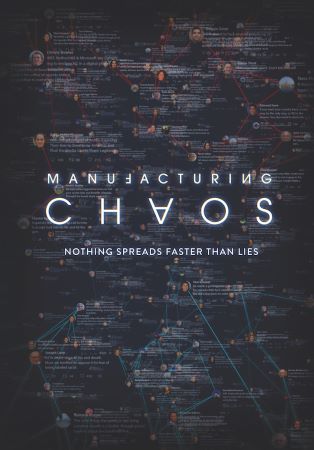
Manufacturing Chaos 2023
Distributed by The Video Project, 145 - 9th St., Suite 230, San Francisco, CA 94103; 800-475-2638
Produced by Megan Jones and Justin Pemberton
Directed by Justin Pemberton
Streaming, 45 mins
College - General Adult
Propaganda; Social Media
Date Entered: 03/28/2024
Reviewed by Cori Biddle, Student Engagement and Outreach Librarian, Robert E Eiche Library, Penn State AltoonaManufacturing Chaos intersperses social media video clips with expert interviews to tell the story of how we arrived at our current social media environment and to extrapolate its future effects. The documentary outlines the rise of Facebook, Twitter (X), and other social media in the 2010s, and discusses the growing influence these companies have on the political and societal landscape. The film makes an early distinction between misinformation, when false information is unknowingly spread, and dis-information, when false information is actively spread on these platforms by specific actors. Often, social media's algorithms are used to amplify dis-information and the film argues that many platforms are complicit with this act, since it drives user engagement.
The film argues that social media's desire to captivate users' attention creates an echo-chamber that has allowed extreme and radical ideas to spread and become increasingly violent. It uses examples like QAnon and the COVID-19 conspiracy theories to demonstrate how these ideas spread and highlights recent events in both the United States and New Zealand to show how these virtual spaces have significant implications in the real world. They also briefly discuss how some of events (like the war in Ukraine) may point to a more organized attempt (by both governments and other organizations) to spread dis-information.
The documentary does not provide answers or outline a way forward. Instead, it paints a bleak picture of how social media platforms, and other nebulous actors, negatively affect society and pose a legitimate threat to our current democratic structures. The documentary ends on an ambiguous note. It spends a few minutes hypothesizing on the negative effect Virtual Reality and AI may have on an already fractured social landscape, but also includes a hopeful note on how this upcoming “digital native” generation is fighting against, and more critical, of the dis-information. While none of the information presented in the documentary is necessarily new to those who already follow social media or information trends, it does succinctly (in about 45 minutes) present the current situation in which we find ourselves.
This film is highly recommended for college classes that cover current events, or information/media studies. Explicit language content in some of the video clips makes it less than ideal for high school level classes. The style of the documentary, with its short video clips, will appeal to students, and its content can be a good primer to a larger discussion of the role of social media and society.
Published and licensed under the Creative Commons Attribution 4.0 license. Anyone can use these reviews, so long as they comply with the terms of the license.